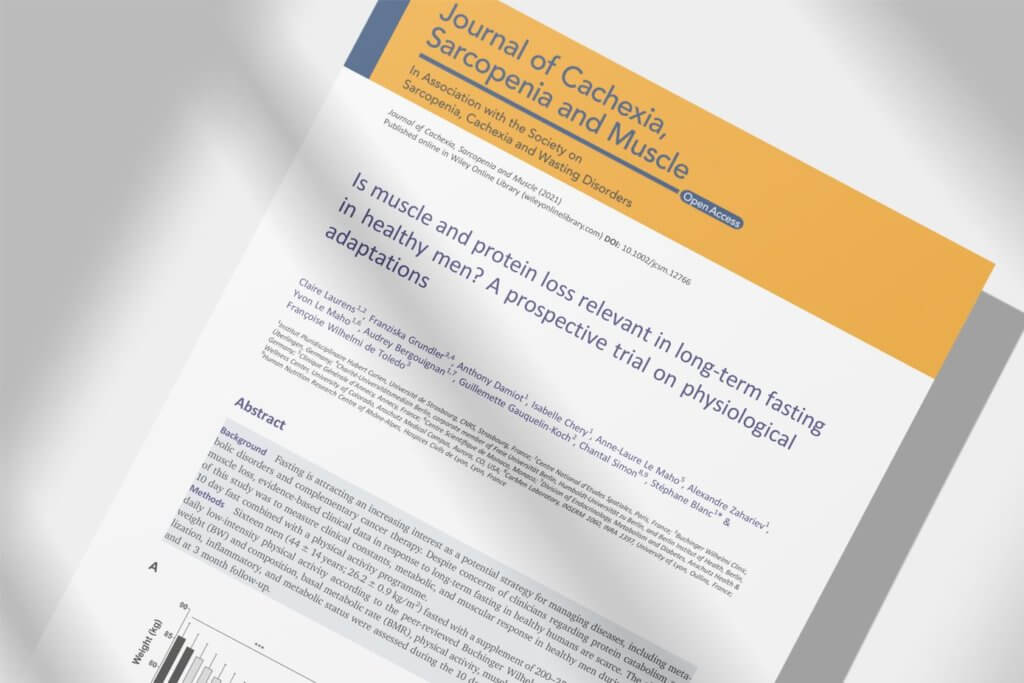THE NEWEST STUDY ON HUMAN LONG-TERM FASTING & MUSCLE LOSS:
Is muscle and protein loss relevant in long-term fasting in healthy men?
A prospective trial on physiological adaptations
Überlingen, 10.11.2021 – Sixteen healthy, non-obese men fasted for ten days according to the Buchinger Wilhelmi fasting programme. This included a daily intake of a protein-free fasting supplement of 200–250 kcal/day in the form of fruit juices and vegetable broth. The subjects also completed a three-hour moderate exercise programme each day.
The average weight loss of 5.9 ± 0.2 kg was explained by the breakdown of fat (40 %), of proteins from metabolically active tissues e.g., liver, kidneys, spleen, intestinal mucosa, heart and skeletal muscles (25 %), of glycogen (8%) and water loss (27 %). Protein sparing mechanisms were triggered after a short time.
The study showed that the muscles are less involved than was long feared, and that muscles regenerate after fasting in the same way as other organ tissues.
No decrease in muscle performance was observed; on the contrary, the performance of the muscles in the lower extremities improved significantly after fasting, while that of the remaining muscles was not affected.
Protein degradation decreased day by day
Protein breakdown, documented by the negative nitrogen balance, decreased from day to day due to the activation of protein sparing mechanisms. Similarly, 3-methylhistidine, a marker of muscle breakdown, decreased after day 5 of fasting. Other proteolysis markers such as GOT and creatinine confirm this observation. When food was reintroduced after fasting, myostatin decreased significantly, promoting the regeneration of muscle mass.
Observations after 3 months fasting program
After three months, the subjects were re-examined. Their general state of health was good. Their body weight was less than before, and their metabolic rate had decreased correspondingly. Values that had increased temporarily during fasting had returned to baseline.
Previous and further fasting studies
As shown in previous publications, the Buchinger Wilhelmi fasting programme – which includes physical activity – is a safe approach to preventing and treating age-related diseases such as obesity, diabetes mellitus type 2 and other metabolic disorders, as well as chronic inflammatory diseases and oxidative stress.
For people of an advanced age who are underweight and suffer from degenerative muscle loss, other nutritional strategies – if therapeutically necessary – are indicated.
Further studies are currently being conducted to evaluate to what extent the above mentioned metabolically active tissues are involved in protein utilisation during fasting. Another topic of current research is the regeneration of these protein structures and cells through new synthesis and from stem cells when food is reintroduced.
Link to the publication: https://onlinelibrary.wiley.com/doi/10.1002/jcsm.12766
Authors
Claire Laurens, Franziska Grundler, Anthony Damiot, Isabelle Chery, Anne-Laure Le Maho, Alexandre Zahariev, Yvon Le Maho, Audrey Bergouignan, Guillemette Gauquelin-Koch, Chantal Simon, Stéphane Blanc, Françoise Wilhelmi de Toledo,
“Is muscle and protein loss relevant in long-term fasting in healthy men? A prospective trial on physiological adaptations”, published in Journal of Cachexia, Sarcopenia and Muscle on October 20, 2021
doi: 10.1002/jcsm.12766
Contact
Dr. Françoise Wilhelmi de Toledo
E-Mail: francoise.wilhelmi@buchinger-wilhelmi.com










